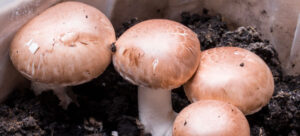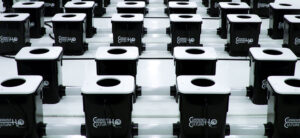
Want to learn how to grow hydroponic raspberries? You’ve come to the right place. These are one of the most popular fruits and for good reason!
They're sweet, refreshing, and full of antioxidants. Raspberries are good for you and they taste great, too.
Growing raspberries is not challenging. There are dozens of varieties to choose from. For a gardener, deciding which kind of raspberries to grow can be more difficult than learning how to grow them.
Hydroponics makes it possible to grow raspberries in any setting, including indoors or in a greenhouse. You don’t need a lot of space or expertise to grow these fruits.
While it can be more difficult to learn how to grow raspberries, the learning curve is definitely one that you can overcome.
Ready to get started with growing raspberries hydroponically? In this article, we’ll tell you everything you need to know to get started, from what kind of system you should choose to how to care for and harvest your plants.
Can Raspberries Be Grown Hydroponically?
Hydroponics is a method of growing plants in nutrient-rich water, without soil. The nutrients are dissolved in the water and taken up by the roots, which then give the plant what it needs to grow.

Hydroponics has been around for centuries but is gaining popularity due to its sustainable nature and ability to produce more food with less work & space than traditional gardening methods.
But can raspberries be grown in such a system?
You might assume that raspberries, due to their sprawling nature, can’t be grown in a hydroponics system. That’s not the case.
These berries can be grown hydroponically, provided you pay special consideration to the type of system you use and the raspberry variety you select. With some careful planning and the right know-how, it is entirely possible to not only grow raspberries hydroponically but to produce a thriving, sustainable crop!
Are Hydroponic Raspberries Difficult To Grow?
Although it can be somewhat difficult to grow raspberries hydroponically, that doesn’t mean you shouldn’t try.
You may find that your yields are slightly reduced compared to what you might be able to grow outside in a soil garden.
This is a trade-off though since you’ll have the ability to grow these plants regardless of where you live. For gardeners who want to grow raspberries but don’t have access to a garden plot to dig a hole, hydroponics is great.
Despite the challenges related to trellising and fertilizing your raspberry plants when growing them hydroponically, you’ll be rewarded with more control over your final product. Any difficulty you might encounter is offset by the many benefits of hydroponic growing.
Using A Raspberry Trellis System
Whether you are growing summer-bearing raspberries in a hydroponic garden, or in well-drained soil outdoors, we have helpful tips to increase yields while making your life easier.
Installing a raspberry trellis system in early spring will make it much easier to harvest, and will keep everything neat and easy to tend to.
Make sure to prune your raspberries during the growing season to encourage more even growth, which makes raspberries produce even more!
Why Grow Hydroponic Raspberries?
Raspberries are one of the most popular berries out there! They're sweet, juicy, and delicious, and can be added to just about any dish.
Growing them at home is a great way to save money on your grocery bill while providing an excellent opportunity for sustainable food production. Homegrown hydro-grown raspberries can be a fun and rewarding experience. Your yields may be slightly lower than those grown in a typical soil-based garden. Consider this when planning your garden.
They are an excellent source of vitamins A, C, K, and manganese. They also contain high levels of fiber and antioxidants which help fight free radicals in the body. Plus, hydroponically grown raspberries tend to be sweeter and even more delicious than those grown traditionally.
Not only will you attain all the regular benefits of hydroponic growing (including the fact that hydroponically grown foods can be produced without as much concern regardings pests and diseases), but you will also benefit from more control of your plants’ quality and nutritional content.
Raspberry plants tend to grow better with more nitrogen than other nutrients, and it can be hard to control these levels in a conventional garden. Not the case with hydroponics!
When you grow hydroponically, you’ll benefit from greater water and nutrient efficiency. It’s an eco-friendly style of gardening that can save resources, time, and money.
With hydroponics, you’ll have more options regarding when you choose to grow, and you can grow year-round or even in the middle of a city.
How Long Does It Take To Grow Raspberries Hydroponically?
Your hydroponic raspberries will be ready for harvest in around four months. That said, once you get the ball rolling, you won’t be slowing down any time soon.
When properly cared for, raspberry plants can produce for 12 months out of the year. Yet another benefit to growing these fruits in a hydroponic setup!
How To Start Growing Raspberries Hydroponically
Raspberries are the perfect plants to try if you are interested in trying to grow hydroponic fruits. Before you do anything else, you’ll need to decide on the best system for growing your plants. Then, it’s simply a matter of feeding and caring for your plants until you’re ready to harvest.
What Type Of System Is Best For Growing Raspberries Hydroponically?
When it comes to growing this hydroponic fruit, just about any hydroponic system will work. There are technically 6 different types of hydroponic systems, but three of these are ideal for raspberries in general.

In general, any system type will work. Growers will rely on methods like ebb and flow, deep water culture (DWC), and drip irrigation.
Ebb and flow systems are ideal for those new to hydroponics. They work automatically, filling up with water from the bottom and draining it back into the reservoir when necessary.
Deep Water Culture, also known as DWC, is a great way to grow plants. This system requires less maintenance, as it has few moving parts. The downside is that it can be difficult to maintain pH levels in the reservoir due to fluctuating water levels or the temperature of the plant itself.
Why Growers Will Opt For A Drip System For Raspberries
Ultimately, most gardeners who decide to grow hydroponic raspberries will do so through drip irrigation.
While ebb and flow and DWC can work well for most other kinds of plants (and can work, if that’s the kind of system you already own) the continuous drenching of the plant’s roots can be detrimental for plants like raspberries.
Raspberries tend to be prone to root rot. Since constant moisture increases the likelihood of this ailment, growing in a drip system is a good idea.
Hydroponic drip systems are a growing trend, as they provide consistent and efficient nutrient feeding to the root zone without aggressive flooding or draining.
With drip systems, growers are able to choose between recovery and non-recovery systems. In a non-recovery system, the nutrient solution does not return to a central reservoir but instead runs off.
Hydroponic Raspberries Propagation - Seeds vs Clones
When growing raspberries hydroponically (and frankly, in any kind of setting) it is not recommended that you start from seed. Instead, use transplants or cut the canes.

Set the roots into your growing medium (or starter plugs) and cover them with a clear plastic dome. Better yet - use a complete seed starting kit.
Keep the plants chilled for two months at temperatures lower than 45 degrees, which will allow them the period of cold dormancy that they need. In many cases, nurseries and garden centers sell raspberry canes that have already been chilled to eliminate this need. Check when you buy to see if this is the case.
Then, they can be transplanted into your hydroponic system. When it comes to choosing which type of raspberries to grow, know that plants can more or less be categorized into two types: primocane, (everbearing) and floricane (summer-bearing).
For hydroponics, you will have much more luck with primocanes. These produce fruit on first-year canes and offer an extended harvest season. They also require less trellising and space than floricane raspberries.
Some of the best options for container growing, in general, include Jewel Black, Heritage Red, and Raspberry Shortcake.
Feeding Your Raspberries Nutrients
pH for your hydroponic raspberries should be right around 5.8 to 6.5. Raspberries, especially early on in their growth, require a fertilizer that is heavy in nitrogen. Use a balanced vegetative formulation, which you should apply in the early stages after the first bud break.
You can then follow this with a formulation designed for bloom or fruiting. Your solution will need to be changed out every week or every other week. You can use an EC meter to check the amount of fertilizer in your reservoir and give you a more accurate idea of when a changeout is necessary.
There’s no hard and fast rule on how often to change out the nutrients in the reservoir because plants don’t take in nutrients at the same rate.
However, it’s important to completely swap out your reservoir on a regular basis rather than just topping it off. This will allow you to get a fresh start without salt build-up in your system.
Caring For Your Hydroponic Raspberries
Raspberries should be kept in somewhat humid, well-lit conditions. 10-12 hours per day is ideal.
Keep temperatures in the range of 70-75 degrees. Humidity should also be kept at around 70%. Humidity control is essential for raspberries. If the air is too dry, it can lead to difficulties with pollination and pests such as spider mites.
But excess humidity, above 90%, will cause issues with pollination, too, and can also cause the fruits to mold.
Unfortunately, these berries can be somewhat prone to fungal disease. Therefore, you should take steps to improve ventilation.
Adding a fan in your grow area can help. As your raspberry plants grow, they will become weighed down with fruit and often bend and break due to their weight. Therefore, at the beginning of the season, you should install a trellis system to help support the plants. We carry all the plant support products you need to get this done at an affordable rate.
You can also prune your plants later on, ideally after you have harvested them. You can remove old leaves and canes to help keep your plants healthy.
Finally, remember that raspberries need to be pollinated. Outdoors, this will happen as bees and insects pollinate the plants or the wind takes care of the task for you.
When growing indoors, you may need to hand pollinate. This can be done by gently brushing the inside of an open flower with a soft brush. However, the easiest way is to simply have a fan blow over the plant's flowers.
How To Harvest Your Hydroponic-Grown Raspberries
It is possible to grow raspberries all year round. To do this, use a staggered growing cycle. Make sure to provide your plants with the right amounts of light, water, and nutrients.
You can pick raspberries whenever the fruits are ripe, keeping in mind that unripe berries won’t ripen off the plant. If you harvest any berries that aren’t fully ripe, you may want to discard them as they will taste bitter and won’t turn red if they aren’t still attached to the plant.
This is a contrast to other kinds of plants you might grow, like hydroponic tomatoes, which will continue to ripen long after they have been harvested and brought indoors.
Put your harvested fruits in a shallow container and then in the refrigerator. They should last two or three days like this.
Final Thoughts On Hydroponic Raspberries
Growing this nutritious hydroponic fruit is a great option. They can be grown in a home or greenhouse. This means they can be enjoyed year-round.
Growing raspberries hydroponically has many advantages. Planting and harvesting are simpler than traditional farming.
Ready to get started growing your own hydroponic fruit, like amazingly sweet and tasty raspberries? Start by shopping Hydrobuilder’s extensive collection of hydroponic growing equipment.
No matter if it’s your first time or if you are a pro, we have everything you need (and at affordable prices!) for a successful growing experience.
Even if you decide you can’t try hydroponics yet, you can still grow amazing raspberries easily at home in a raised bed, or other containers.



































